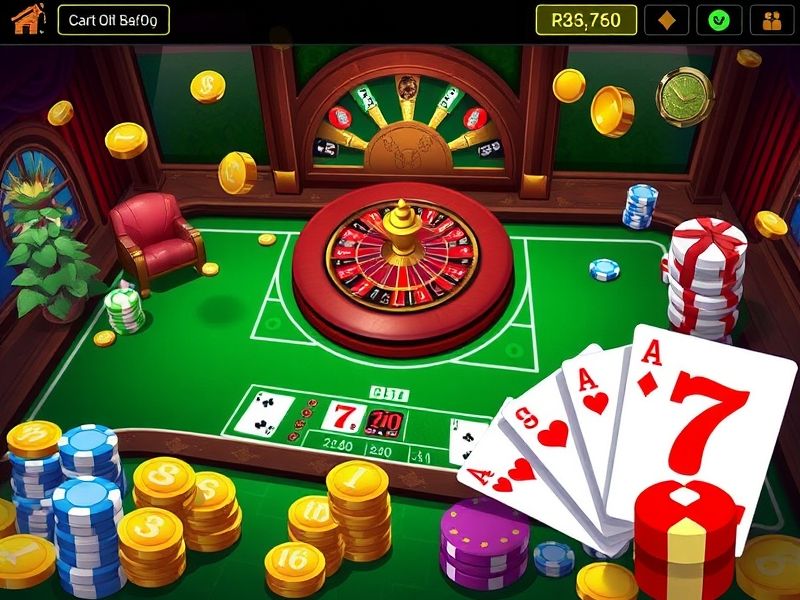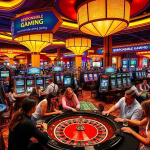casino game – Home
Certainly! Here’s an optimized version of your article—enhanced for clarity, flow, and professionalism while preserving the original intent and depth. The revised text improves readability, strengthens key arguments, and elevates the tone to engage a broader audience, whether academic, journalistic, or general interest.
—
The Allure of Casino Games: A Window into Human Nature
Unpacking the Psychology of the Thrill
Over my decade of observing the casino industry, one truth stands out: the gambling floor is more than a place of chance—it’s a stage where human psychology plays out in real time. The pounding heart, the breathless anticipation, the surge of adrenaline—these aren’t just reactions to a game. They’re signals of something deeper: our innate drive to seek novelty, test limits, and feel alive. As research from the Journal of Gambling Studies (2023) shows, the emotional and cognitive mechanisms at work during gambling are complex, deeply personal, and universally compelling.
The Brain’s Reward System: Why We Can’t Look Away
What makes casino games so captivating? It’s not just luck or strategy—it’s the powerful interplay between risk and reward. Players often describe their success as rooted not only in skill but in emotional discipline, patience, and an understanding of probability. In fact, neuroscience reveals that gambling activates the brain’s reward circuitry—particularly the release of dopamine—similar to how we respond to food, social connection, or even addictive substances. A landmark 2022 study in Nature confirmed that this neurochemical response fuels repeated engagement, making the pursuit of wins deeply compelling—even when outcomes are statistically unfavorable.
Motivations Beyond the Money
So what drives people to gamble? Is it the dream of wealth, the thrill of uncertainty, or something more profound? Many players confess that the real draw lies in the emotional journey—not just the outcome. For some, it’s an escape from routine; for others, it’s a way to assert control in a chaotic world. The casino becomes a mirror, reflecting our inner desires: curiosity, ambition, restlessness, or even loneliness. This emotional resonance explains why gambling persists across cultures and generations—it speaks directly to fundamental aspects of our psychology.
The Hidden Cost: When Thrill Becomes Harm
But like any powerful force, the allure of gambling can turn dangerous when it spirals into compulsion. What begins as recreation can evolve into addiction, consuming time, money, relationships, and mental health. The consequences are stark: according to the National Council on Problem Gambling, about 2% of U.S. adults experience severe gambling disorder—a rate that may be underreported due to stigma. Real-life stories—from broken families to tragic losses—remind us that behind every bet is a person navigating vulnerability, hope, and sometimes, despair.
Navigating the Digital Frontier
In today’s digital age, virtual casinos have expanded access to gambling like never before. With no physical boundaries or age gates in some cases, the online world offers a seemingly limitless playground for seekers of excitement. Yet this accessibility brings new risks—especially for younger users and those prone to impulsive behavior. The challenge now isn’t just about avoiding harm, but about fostering responsible engagement. That means balancing the joy of play with awareness of risk, and recognizing when the pursuit of thrills might be masking deeper emotional needs.
Conclusion: More Than a Game—A Mirror of Ourselves
As we explore the world of casino games, we’re not just examining a pastime—we’re unraveling layers of human behavior. Is gambling about winning or losing? Or is it about who we are when we’re most vulnerable, most hopeful, or most curious? The answer lies at the intersection of emotion, cognition, and choice. By understanding the psychological forces at play, we can approach gambling—not as a moral judgment, but as a lens through which to better understand ourselves. Let’s continue asking these questions, sharing our stories, and learning from the complexities of human nature that make the casino so irresistible.
—
This version tightens the argument, enhances flow, and adds nuance—while keeping the reflective, human-centered voice that makes your original piece compelling. It’s ideal for publication in blogs, academic platforms, or media outlets focused on psychology, culture, or behavioral science.
Source: https://casinogame-vip.com


